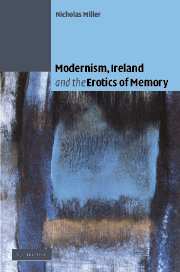Book contents
- Frontmatter
- Contents
- List of illustrations
- Acknowledgments
- Introduction. All history is local: modernism and the question of memory in a global Ireland
- Part I THE EROTICS OF MEMORY
- Part II THE SPECTACLES OF HISTORY
- 4 The birth of a nation: Irish nationalism and the technology of memory, 1891–1921
- 5 Fighting the waves: Yeats, Cuchulain and the lethal histories of “romantic Ireland”
- 6 Joyce's erotics of memory: temporal anamorphosis in Finnegans Wake
- Afterword. The ends of memory and the ex-sistence of Ireland
- Notes
- Bibliography
- Index
4 - The birth of a nation: Irish nationalism and the technology of memory, 1891–1921
Published online by Cambridge University Press: 22 September 2009
- Frontmatter
- Contents
- List of illustrations
- Acknowledgments
- Introduction. All history is local: modernism and the question of memory in a global Ireland
- Part I THE EROTICS OF MEMORY
- Part II THE SPECTACLES OF HISTORY
- 4 The birth of a nation: Irish nationalism and the technology of memory, 1891–1921
- 5 Fighting the waves: Yeats, Cuchulain and the lethal histories of “romantic Ireland”
- 6 Joyce's erotics of memory: temporal anamorphosis in Finnegans Wake
- Afterword. The ends of memory and the ex-sistence of Ireland
- Notes
- Bibliography
- Index
Summary
The modern literature of Ireland, and indeed all that stir of thought which prepared for the Anglo-Irish war, began when Parnell fell from power in 1891. A disillusioned and embittered Ireland turned from parliamentary politics and the race began, as I think, to be troubled by that event's long gestation.
W. B. Yeats Address to the Swedish Academy upon accepting the Nobel PrizeOn September 18, 1916, three weeks shy of the twenty-fifth anniversary of the death of Charles Stewart Parnell, the “Uncrowned King” himself appeared to an audience assembled at Dublin's Gaiety Theatre. The occasion was the Irish debut of D. W. Griffith's The Birth of a Nation, a film already notorious at that time for the technical brilliance and unvarnished racism of its director. In the days immediately following Parnell's death in 1891, a rumor had circulated that his coffin buried in Glasnevin Cemetery was filled with stones. The idea that the great leader might not really be dead had led to Elvis-style sightings all over Ireland and as far away as Germany, where Parnell's sometime political ally John Dillon claimed to have seen the great leader attending a performance of the Wagner opera, Götterdammerung [The Twilight of the Gods] (Lyons, Charles Stewart Parnell, 603). In a country as rife with unresolved histories as Ireland, the appearance of ghosts is probably to be expected, and even, perhaps, taken for granted.
- Type
- Chapter
- Information
- Modernism, Ireland and the Erotics of Memory , pp. 97 - 126Publisher: Cambridge University PressPrint publication year: 2002



